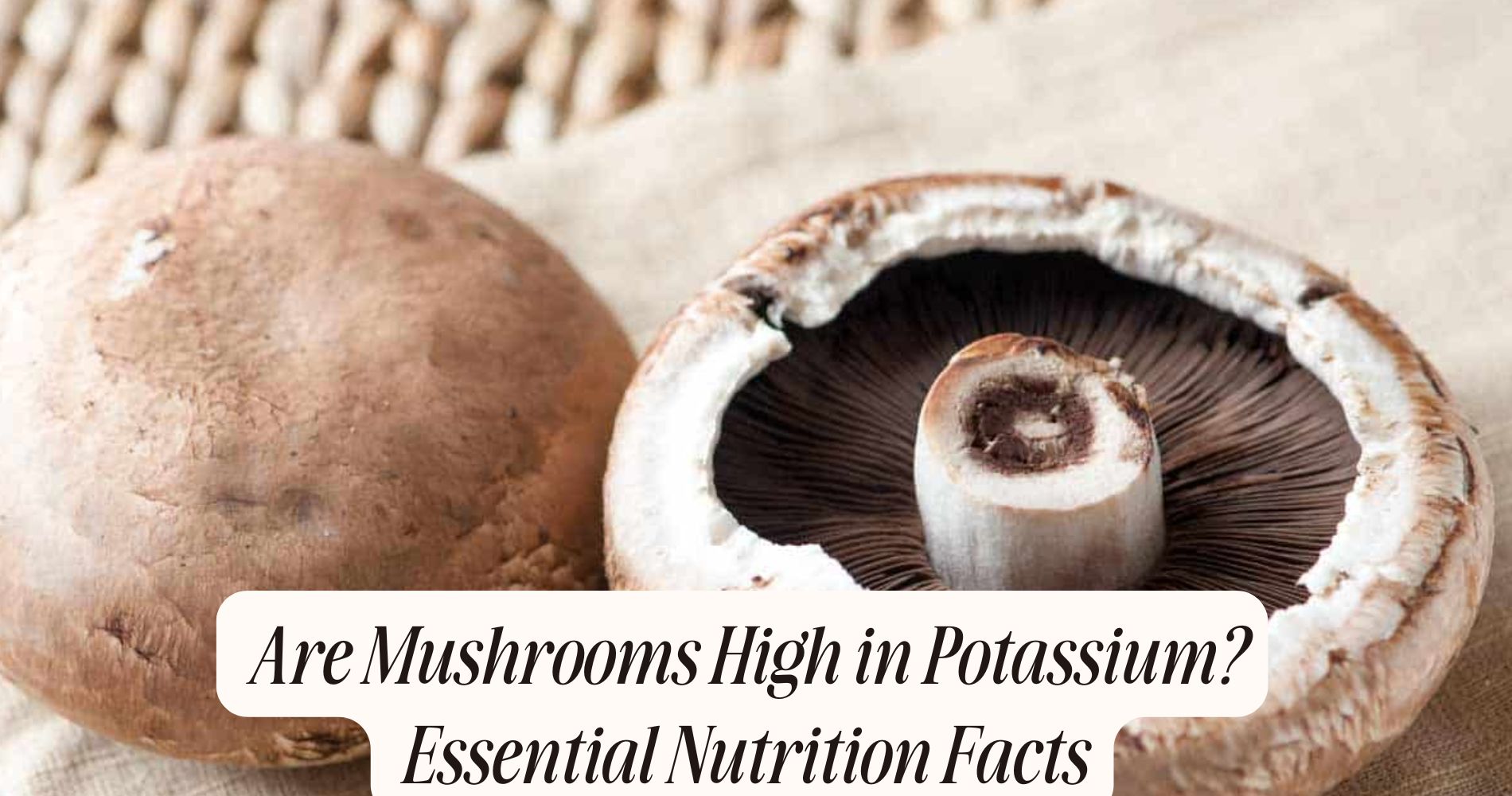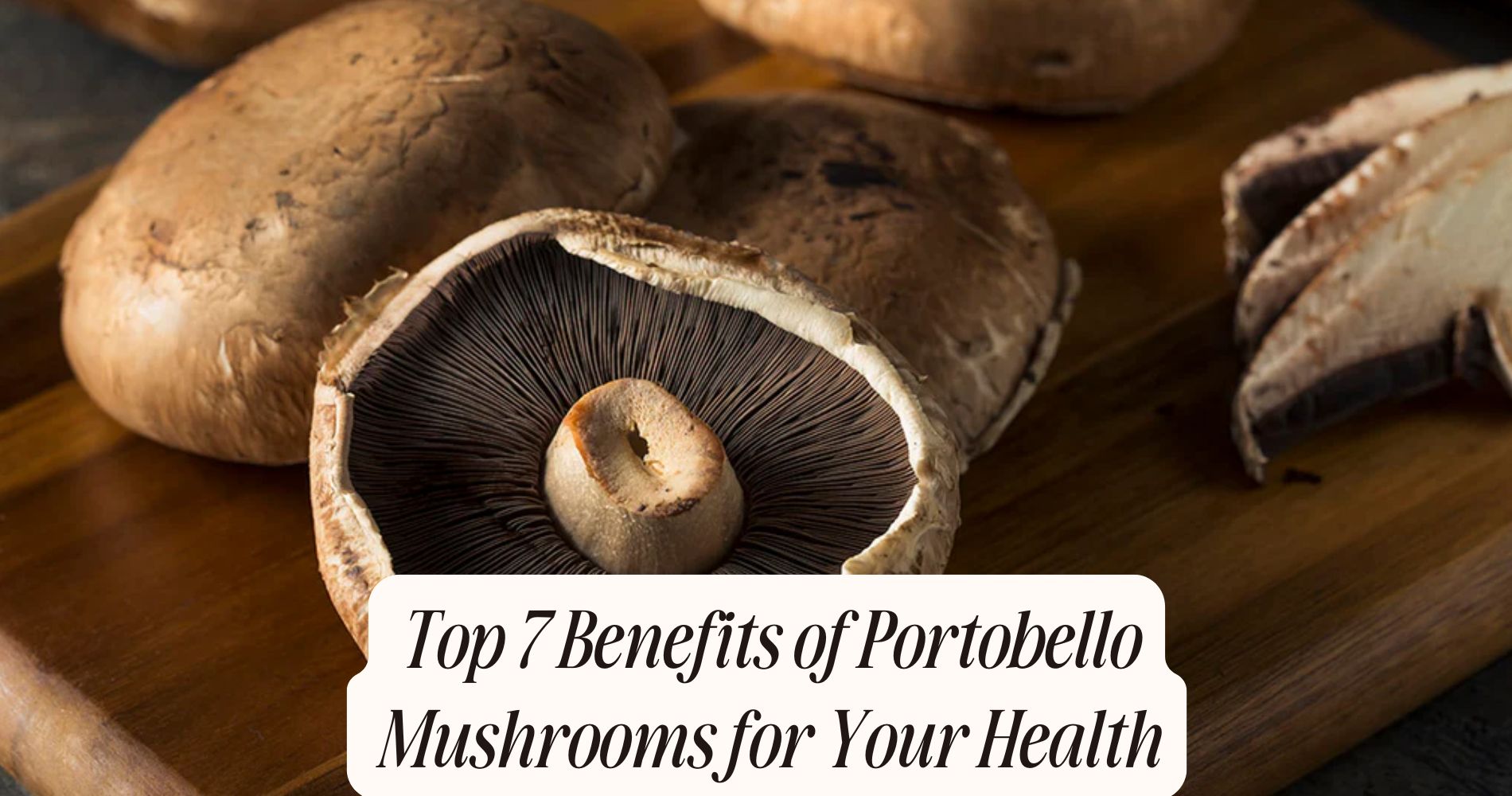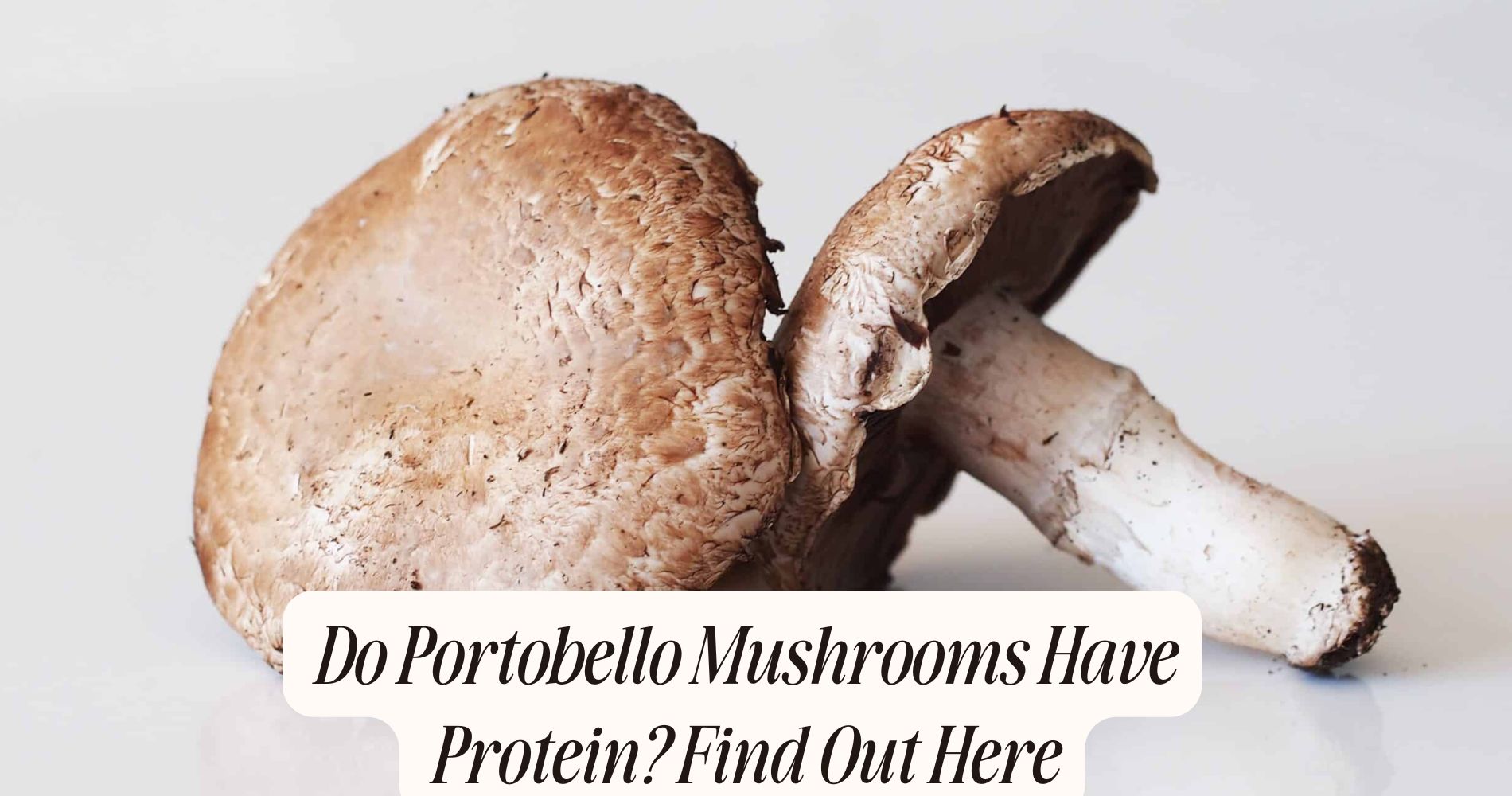
Are Mushrooms High in Potassium? Essential Nutrition Facts
Are mushrooms high in potassium? Mushrooms are indeed high in potassium, providing a significant boost to your daily intake. Varieties like cooked shiitake mushrooms can deliver around 600 mg of potassium per cup, while portobello mushrooms also contain substantial amounts. Incorporating mushrooms into your meals not only enhances flavor but also supports heart health and muscle function. They're low in calories and packed with other nutrients, making them a versatile addition to your diet. If you're curious about the specific benefits of different mushroom types or how to cook them for maximum nutrient retention, there's more valuable information to explore.
Understanding Potassium's Role
Although many people overlook potassium, it plays an essential role in maintaining various bodily functions. This mineral is fundamental for regulating fluid balance, muscle contractions, and nerve signals. When you consume adequate potassium, you support heart health and reduce the risk of hypertension.
To achieve a proper dietary balance, you need to include potassium-rich foods in your meals. Some excellent potassium sources include bananas, sweet potatoes, spinach, and avocados. Incorporating these foods into your diet can help maintain ideal potassium levels and promote overall well-being.
It's important to note that while potassium is essential, balance is key. Too little potassium can lead to muscle weakness and cramping, while excessive amounts can be harmful, especially for individuals with kidney problems.
As a result, focus on integrating potassium-rich foods gradually and monitor your intake to guarantee you're not overdoing it.
Nutritional Profile of Mushrooms
Mushrooms are a powerhouse of nutrition, offering a unique blend of vitamins, minerals, and antioxidants. They come in various mushroom varieties, each with its distinct nutritional profile. For instance, button, shiitake, and portobello mushrooms are rich in B vitamins, such as riboflavin and niacin, which play vital roles in energy metabolism and cell function.

Mushrooms are also low in calories and fat, making them a great addition to a balanced diet. Their high fiber content aids digestion and promotes gut health. Additionally, mushrooms contain important minerals like selenium, which supports immune function and acts as an antioxidant.
In culinary uses, mushrooms can enhance the flavor and texture of many dishes. You can sauté them, add them to soups, or use them as a meat substitute in various recipes.
Their versatility allows you to incorporate them into salads, stir-fries, and pasta dishes, making it easy to enjoy their nutritional benefits. By including a variety of mushroom types in your meals, you not only boost your nutrient intake but also add depth to your culinary creations.
Potassium Content in Different Varieties
When you explore different mushroom varieties, you'll find notable differences in their potassium content.
For instance, common types like button mushrooms and portobello offer varying nutritional benefits.
A nutritional comparison chart can help you understand which mushrooms pack the most potassium for your diet.
Common Mushroom Varieties
With a variety of mushroom types available, understanding their potassium content can help you make informed dietary choices. Common edible varieties like button, shiitake, and portobello mushrooms each bring unique flavor profiles and culinary uses to your plate.
For instance, button mushrooms are versatile and often used in salads or stir-fries, while shiitakes are prized for their rich, umami flavor, making them perfect for soups and sauces.
In terms of potassium content, portobello mushrooms stand out, boasting higher levels compared to their counterparts. This makes them an excellent choice if you're looking to boost your potassium intake.

Additionally, some medicinal mushrooms, such as reishi and lion's mane, provide not only nutritional benefits but also potential health advantages.
When foraging for mushrooms, always familiarize yourself with safe species and preservation methods, as some wild varieties can be toxic.
Nutritional Comparison Chart
Understanding the potassium content in different mushroom varieties can greatly enhance your dietary choices. Mushrooms aren't only delicious but also serve as excellent potassium sources.
Here's a quick comparison of potassium levels in some common mushroom varieties per 100 grams.
-
White Button Mushrooms: Approximately 318 mg of potassium. These are the most commonly consumed mushrooms and offer a decent amount of potassium.
-
Cremini Mushrooms: About 306 mg of potassium. Slightly richer in flavor than white button mushrooms, they still provide a substantial potassium boost.
-
Portobello Mushrooms: Roughly 364 mg of potassium. Their meaty texture makes them a popular choice, and they contain the highest potassium content among these varieties.
-
Shiitake Mushrooms: Around 304 mg of potassium. These mushrooms are known for their unique taste and also contribute to your potassium intake.
-
Oyster Mushrooms: Approximately 420 mg of potassium. With the highest potassium content, oyster mushrooms can be a great addition to your meals.
Incorporating these mushroom varieties into your diet can help you meet your potassium needs effectively.
Comparing Mushrooms to Other Foods
Examining the nutritional profile of mushrooms reveals their surprising potassium content compared to other common foods. Various mushroom varieties, such as shiitake, portobello, and button mushrooms, provide a decent amount of dietary potassium. For instance, a cup of cooked shiitake mushrooms can offer around 600 mg of potassium, making it a notable potassium source.
When you compare mushrooms to other foods, such as bananas or sweet potatoes, you'll find that while those foods may have higher potassium levels, mushrooms pack a unique nutritional density. They offer health benefits beyond potassium, including antioxidants and vitamins, which enhance their overall value in your diet.
Incorporating mushrooms into your meals can be an effective way to meet dietary guidelines for potassium intake. Additionally, various cooking techniques, like sautéing or grilling, enhance their flavor while retaining their nutritional benefits.
Health Benefits of Potassium
Potassium plays an essential role in supporting your heart health, ensuring your muscles function effectively, and helping regulate blood pressure.
By maintaining adequate potassium levels, you can enhance your overall well-being and reduce the risk of certain health issues.
Incorporating potassium-rich foods, like mushrooms, into your diet can be a simple yet impactful way to reap these benefits.
Heart Health Support
When it comes to maintaining a healthy heart, potassium plays an essential role in regulating blood pressure and supporting overall cardiovascular function. This mineral helps balance sodium levels in your body, which is key for preventing hypertension. A diet rich in potassium can lower your risk of heart disease and stroke, making it critical for heart health.
Mushrooms are a fantastic potassium source, offering a delicious way to boost your intake. Incorporating mushroom recipes into your meals can help you meet your daily potassium needs while adding flavor and nutrition to your diet. For example, sautéed portobello mushrooms or a hearty mushroom risotto can easily enhance your potassium levels.
In addition to mushrooms, other potassium-rich foods include bananas, sweet potatoes, and spinach. A balanced diet that includes these foods can help maintain ideal potassium levels, ultimately benefiting your heart.
Muscle Function Enhancement
For ideal muscle function, potassium is essential in maintaining proper muscle contractions and preventing cramps. This mineral plays a significant role in the electrical signaling that triggers muscle contractions, ensuring your muscles perform effectively during physical activities.
When you engage in exercise, potassium helps regulate fluid balance and supports nutrient absorption, which are crucial for efficient muscle recovery.
If you don't get enough potassium, you might experience muscle weakness or cramps, especially after intense workouts. Foods rich in potassium, like mushrooms, can aid in replenishing this important electrolyte. Ensuring adequate potassium intake not only enhances your muscle function but also contributes to overall athletic performance.

Moreover, potassium helps transport nutrients throughout your body, which is necessary for muscle health. When your muscles recover efficiently, you can bounce back quicker from strenuous activities and enhance your performance in future workouts.
Blood Pressure Regulation
Maintaining healthy blood pressure levels is essential for overall cardiovascular health, and potassium plays a vital role in this process. When you consume adequate potassium, it helps to balance sodium levels in your body, which can lower blood pressure. Foods rich in potassium can counteract sodium's negative effects, leading to improved heart health.
Mushroom varieties, such as white button, shiitake, and portobello, are excellent potassium sources that can easily be added to your diet. For instance, a cup of cooked shiitake mushrooms contains around 600 mg of potassium, making it a valuable addition to meals aimed at regulating blood pressure.
Incorporating these mushrooms into your dishes not only enhances flavor but also boosts your potassium intake, which is essential for maintaining ideal blood pressure. Research indicates that diets high in potassium can notably reduce the risk of hypertension and stroke.
How Mushrooms Support Heart Health
Mushrooms pack a powerful punch when it comes to supporting heart health. Various mushroom varieties, like shiitake and portobello, offer heart benefits due to their impressive potassium content, which helps regulate blood pressure.
As you seek potassium sources for a healthy diet, mushrooms stand out for their nutrient density, making them an excellent choice for maintaining dietary balance.
Incorporating mushrooms into your meals aligns with health recommendations that emphasize plant-based foods. Their low-calorie nature and rich nutrient profile support dietary guidelines aimed at reducing the risk of cardiovascular diseases.
Plus, their unique flavors enhance dishes while providing essential nutrients. Mushrooms also exemplify nutritional synergy, as they combine well with other heart-healthy ingredients, boosting the overall health benefits of your meals.
Employing various cooking techniques, like sautéing or grilling, can further amplify their heart-supporting properties. By adding mushrooms to your diet, you're not just enjoying their delicious taste; you're also taking a proactive step in supporting your heart health.
Cooking Methods and Nutrient Retention
When it comes to cooking mushrooms, the method you choose can considerably impact their nutrient retention.
Steaming is one of the most efficient methods, preserving both vitamins and minerals effectively. The steaming efficiency helps maintain potassium levels, making it a great option if you want to maximize nutrient intake.
On the other hand, sautéing can have a notable impact on nutrient retention. While it allows for quick cooking, the exposure to heat can cause some nutrient loss.
Roasting, while flavorful, may also have effects on nutrients, particularly if mushrooms are cooked for extended periods.
Boiling is often the least favorable method, leading to significant boiling losses of potassium and other essential nutrients.
Grilling, however, offers benefits by retaining more nutrients compared to boiling, while also enhancing flavor.
Daily Potassium Recommendations
For ideal health, you should aim to meet the daily potassium recommendations set by health authorities. The current recommended intake for adults is about 2,500 to 3,000 milligrams per day, depending on age and gender. Meeting this goal is important, as potassium plays a significant role in maintaining proper muscle function, regulating blood pressure, and supporting heart health.
You can obtain potassium from a variety of potassium sources, including fruits, vegetables, legumes, nuts, and dairy products. Foods like bananas, sweet potatoes, and spinach are particularly high in potassium, making them excellent choices to help you reach your daily intake.
While mushrooms do contain potassium, they're not the richest source, so it's important to include a diverse range of foods in your diet.
To guarantee you're hitting your potassium target, consider keeping a food diary or using a nutrition app. This way, you can track your intake and make adjustments as needed.
Tips for Incorporating Mushrooms
Incorporating mushrooms into your diet can be both easy and enjoyable, as they add flavor, texture, and nutritional benefits to a variety of dishes. Start by experimenting with different mushroom recipes; sautéed dishes with garlic and herbs are a great choice.
You can also toss sliced mushrooms into stir fry ideas, pairing them with colorful veggies for a nutrient-dense meal. For meal prep, consider making stuffed mushrooms filled with quinoa, spinach, and cheese. These vegetarian options aren't only delicious but also an excellent way to boost your potassium intake.
You can use mushrooms as healthy toppings for pizza, salads, or even tacos, adding a savory depth to your meals. Don't forget the power of flavor pairings. Mushrooms pair well with various ingredients like thyme, rosemary, and even soy sauce, enhancing the overall taste of your dishes.

Try adding them to omelets or grain bowls for an extra punch. With these tips, you'll discover the versatility of mushrooms while enjoying their health benefits. So, get creative, and let mushrooms take center stage in your kitchen!
Myths About Mushrooms and Nutrition
You might've heard some common myths about mushrooms and their nutritional value.
Many people underestimate their health benefits or believe they lack essential nutrients.
Let's clarify these misconceptions and highlight the true nutritional power of mushrooms.
Common Misconceptions Explained
When it comes to mushrooms and nutrition, several myths can cloud our understanding of their benefits, particularly regarding potassium content. One common misconception is that all mushrooms are low in potassium. In reality, while some varieties contain less potassium, many, like shiitake and portobello, are actually rich in this essential nutrient.
Myth debunking is essential here, as believing that all mushrooms lack potassium might lead you to overlook a valuable dietary source.
Another myth is that mushrooms can't contribute notably to daily potassium intake. While they may not be the highest potassium foods, they can still play a role in a balanced diet, especially when combined with other potassium-rich foods like bananas and spinach.
Additionally, some people think mushrooms are primarily a source of protein. While they do contain protein, their true strength lies in their diverse nutrient profile, which includes vitamins, minerals, and antioxidants.
Nutritional Value Clarified
Mushrooms boast a remarkable nutritional profile that often goes underappreciated. While many believe mushrooms lack essential nutrients, they actually offer a variety of health benefits. Different mushroom varieties, such as shiitake, portobello, and cremini, provide not only unique flavors but also a range of vitamins and minerals.
One common myth is that mushrooms aren't suitable potassium sources. In reality, certain mushroom varieties contain significant amounts of potassium, which is vital for maintaining healthy blood pressure and muscle function. For example, a cup of cooked shiitake mushrooms can deliver around 300 mg of potassium, contributing to your daily intake.
Additionally, mushrooms are low in calories and fat, making them an excellent choice for those looking to maintain a balanced diet.
They're also rich in antioxidants, which help combat oxidative stress in the body. Incorporating various mushroom types into your meals can enhance nutritional value without adding excessive calories.
Boost Your Wellness with 10-IN-1 MUSHROOM GUMMIES
While exploring are mushrooms high in potassium, consider Well Gummies’ 10-IN-1 MUSHROOM GUMMIES as an easy way to enjoy the health benefits of multiple mushrooms. Each vegan gummy combines 10 powerful mushrooms, delivering calm energy, sharper focus, and immune support in a convenient chewable form. With a refreshing wild berry flavor, these gummies are as tasty as candy but provide balanced, jitter-free energy throughout the day. Add them to your daily routine for a natural boost to both mind and body wellness.
Frequently Asked Questions
Are There Any Potassium-Related Side Effects From Consuming Mushrooms?
Consuming mushrooms in moderation typically doesn't cause potassium-related side effects. However, certain mushroom varieties may affect potassium absorption, especially in individuals with kidney issues. Always consult a healthcare professional if you have concerns about your intake.
Can Mushrooms Help With Potassium Deficiency?
Mushrooms can help with potassium deficiency, especially certain mushroom varieties. While they aren't the primary potassium sources, incorporating them into your diet can contribute to overall potassium intake, supporting your health and balancing nutrient levels effectively.
Do Cooking Methods Affect Mushroom Potassium Levels?
Yes, cooking techniques can affect nutrient retention in mushrooms. Methods like steaming or sautéing preserve more potassium compared to boiling, which may cause nutrient loss. Choose your cooking style wisely to maximize the nutritional benefits.
How Do Mushrooms Compare to Potassium-Rich Supplements?
When you compare mushroom varieties to potassium-rich supplements, you'll find mushrooms offer natural potassium absorption, but supplements often provide higher concentrations. A balanced diet including mushrooms can complement your potassium intake effectively.
Are There Specific Mushrooms That Are Better for Potassium Intake?
Certain mushroom varieties, like shiitake and portobello, have higher potassium content than others. Including these in your diet can boost your potassium intake effectively while providing other essential nutrients and health benefits. Enjoy them regularly!
Conclusion
Incorporating mushrooms into your diet can boost your potassium intake while providing essential nutrients. With various varieties offering differing potassium levels, they're a versatile addition to meals. Remember, potassium is important for heart health and muscle function, so understanding your daily needs is essential. By exploring different cooking methods, you can maximize nutrient retention. Don't let myths about mushrooms mislead you—embracing their health benefits can enhance your overall nutrition. Happy cooking!




